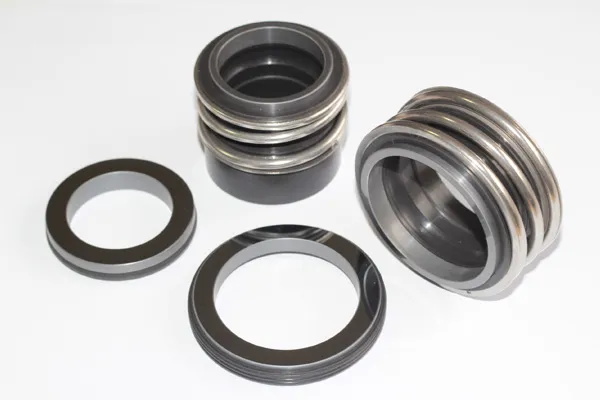MECHANICAL SEALS

Descrizione del prodotto
What are mechanical seals (End-face Mechianical Seal)? Also known as a face seal, the mechanical seal is a rotary machine shaft seal device, refers to the mechanical seal at least a pair of perpendicular to the axis of rotation of the end surface in the liquid pressure and compensation for the role of tissue elastic (or magnetic) and auxiliary seal cooperation, so as to keep the paste and the relative sliding and constitute the equipment to avoid leakage of fluid. The primary function of mechanical seals is to prevent leakage of gases and liquids in rotating shaft applications. It is widely used in mechanical seal specifications for pump, kettle, compressor and other similar equipment, e.g. the rotation of the shaft seal.
Different Types of Mechanical Seals for Pumps
Elastomer Rubber Bellow Mechanical Seals
Standard and OEM elastomer bellows seals are available.
Metal Bellow Mechanical Seals
Widely used in high-temperature condition and harsh chemical application.
PTFE Teflon Bellow Mechanical Seals
Applied for any chemical medium; long service life.
Single Cartridge Seals
Easy operation of pump shaft seals replacement; stable performance.
O Ring Mechanical Seals
Low cost and stable performance; applied for garden hose couplings, chemical plant, etc.
Double Cartridge Mechanical Seals
Easy installation and operation; no start-up leakage problem.
PTFE Wedge Mechanical Seals
Suitable for all the major pump equipment; generally for low to medium pressure conditions.
Flygt Mechanical Seals
Full range of products; low cost and low leakage rate; easy installation.
O.E.M Mechanical Seals
High quality and low cost; fast delivery.
Stationary Seats
Easy installation and low leakage; different standard shapes are available.
Your Reliable Water Pump Seals Supplier
Sealcon offers you wide range of standard mechanical seals, individual solutions and diverse services. Find more about Sealcon's mechanical seals for pump from here.
How do Mechanical Seals Work?
parts of mechanical seal are usually made of moving rings, stationary rings, compression elements and sealing elements. These parts are tightly bonded to form a sealing surface to avoid leakage. The liquid in the sealed chamber causes the end face to press against the end face of the stationary ring, and the mechanical seal occurs on the end faces of the two rings and the adhesion is to maintain the compression of the component pressure. The pump can not only work in the state, but also adhere to the end of the paste to ensure that the sealing medium does not leak, and avoid impurities into the sealed end. The sealing element acts as a gap between the sealing ring and the shaft, the action of the static ring and the gap of the gland, and the oscillation of the pump with the elastic element. When running with other components of the pump, the condition of the mechanical seal is closely linked with the external conditions. Only if the parts, auxiliary sealing equipment and technical requirements are ensured that the mechanical seal works well.
How to Install Mechanical Seals?
First, we need to turn off the pump, and then clean and inspect each part of the pump. Second, remove the impeller by rotating it in the anticlockwise direction. Then take out the seal at the backside of the impeller, and place the mechanical seal on to the shaft. Fix the mechanical seal and screw the impeller onto the motor shaft. Here are some notes of installation:
Pay more attention to avoid installation deviation;
The compression quantity of the spring should be carried out according to the regulations. Bigger or smaller are not allowed. The error should be within 2 millimeters;
To ensure the beard can move flexibly on the shaft. And the spring should be able to automatically bounce back when the dynamic ring compressing the spring.
Notes of disassembling the mechanical seals;
Be careful when disassembling the mechanical seals: don’t use a hammer or chisel in case of damage.

